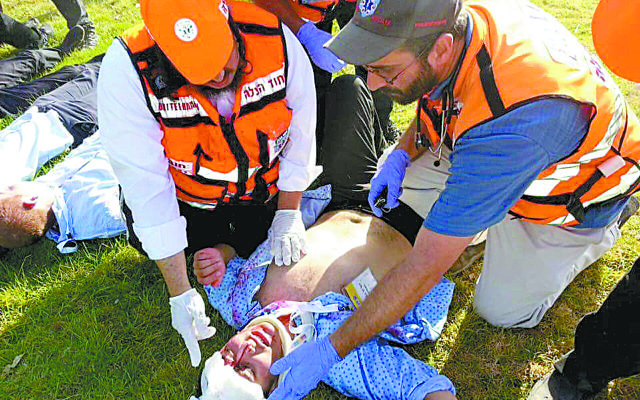Atlanta Answers Beit Shemesh’s Call
At 3 a.m. in Ramat Beit Shemesh, physician Arie Pelta receives an emergency call on number 1221.
“I have chest pain,” whispers a man on the line. Within 90 seconds, Pelta, a volunteer for United Hatzalah, is by his side.
United Hatzalah, the rescue organization Eli Beer started in Israel 25 years ago, has more than 3,000 volunteers who have gone through eight months of training to be emergency medical technicians.

Beit Shemesh, a rapidly growing city of more than 100,000 residents, has many EMTs, but Pelta is the only physician volunteer in the area. He can administer drugs and, if necessary, insert a tube into a patient’s throat to facilitate breathing or drug administration.
But Pelta, a former Atlanta resident who made aliyah in July 23, 2013, is limited because he doesn’t have a 12-lead cardiac monitor, known as a Lifepak.
“When calling 911 in Atlanta, every paramedic walks in with a Lifepak,” Pelta said. He explained that this portable EKG machine monitors the rhythm of the heart, gives lifesaving shocks, measures blood pressure and oxygen levels, and “verifies the correct placement of the endotracheal tube after intubation.”
Only one paramedic on one ambulance provided for all of Beit Shemesh by Magen David Adom, Israel’s equivalent of the Red Cross, carries a Lifepak.
Pelta traces his lineage to ancestors who fled Spain during the Inquisition and settled in Poland, then suffered through pogroms and escaped to America during the Holocaust. Some of his relatives made it to Israel.
He also wanted to make aliyah and made it a prerequisite before marriage, a goal he and his wife, Alyssa, and their children fulfilled when they left Atlanta three years ago.
Now he and his wife hike the mountains near Beit Shemesh, where David defeated Goliath. Although he made more money in Atlanta than he does working five jobs in Israel, the surgeon said Israel is where he wants to be. “We’re in the right place without question.”
He said Israel is experiencing a “population explosion” through aliyah. “It causes housing shortages connected to supply and demand, which ties in with medical problems.”
He and his family live in Ramat Beit Shemesh Alef, a Beit Shemesh suburb where many Americans, including other former Atlantans, reside. The nearest hospital is over 40 minutes away, so Pelta’s services are crucial.
“Someone with chest pains could die on the way to the hospital,” he said.
As David overcame Goliath, Pelta is trying to overcome adversity. “When someone calls (with a medical emergency), I don’t have the proper monitor.”
Remembering the fundraising of Atlanta Friends of United Hatzalah, Pelta contacted Brian and Suzanne Spaner.
In 2011 the Spaners and others in Atlanta, including Pelta, raised $100,000 for a Hatzalah ambutractor and several ambucycles in Safed. Now the doctor asked the Spaners whether they could help raise the money for a Lifepak in Beit Shemesh.
Pelta wrote to them in an email that he was “surprised that this equipment is not already available for the largest aliyah city in Israel.”
The Spaners contacted Beer and his team and found out that the cost of a Lifepak is $23,000. They asked Beer to set up a website (israelrescue.org/lifepakbeitshemesh) to help raise money for the lifesaving effort. More than $13,000 has been raised through the site, and an anonymous Congregation Beth Jacob family has pledged to match $5,000 in donations.
Pelta recently saved the life of a 90-year-old man. Now he’s calling on the worldwide Jewish community to help United Hatzalah save more lives in Beit Shemesh.




comments